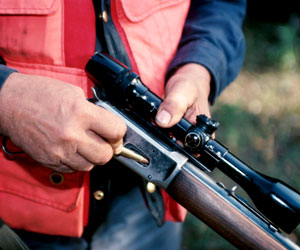 Feb. 28, 2011 – The act of hunting wild animals does not insulate hunters from laws against animal cruelty, the District IV Wisconsin Court of Appeals recently held.
Feb. 28, 2011 – The act of hunting wild animals does not insulate hunters from laws against animal cruelty, the District IV Wisconsin Court of Appeals recently held.
Rory and Robby Kuenzi, who used their snowmobiles to injure and kill deer in Waupaca County by running them over and ramming them, were criminally charged on multiple felony counts of animal cruelty under Wis. Stat. section 951.02.
But the circuit courts dismissed the charges after both men argued the animal cruelty statute did not apply to hunters engaged in taking wild animals, no matter how cruel the means by which the animal is taken, because hunting activity is regulated exclusively by Wis. Stat. ch. 29.
In State v. Kuenzi, 2009AP1827 & 2009AP1828 (Feb. 24, 2011), the appeals court reversed, ruling that section 951.02’s prohibition on cruel mistreatment of animals applies to all animals, including non-captive wild animals.
Section 951.02 provides that “no person may treat any animal … in a cruel manner.” The term “animal” is defined as every warm-blooded non-human creature, amphibian, and reptile. “Cruel” means “causing unnecessary pain or suffering or unjustifiable injury or death.”
While section 951.02 bans the mistreatment of animals, Wis. Stat. ch. 29 regulates the taking of non-captive wild animals. Under section 951.015(1), prosecutions under section 951.02 may not controvene laws regulating the taking of non-captive wild animals under ch. 29.
Thus, the Kuenzi’s argued that 951.02 does not apply to hunters who are attempting to take non-captive wild animals like the deer at issue in the case. The appeals court did not agree.
Are wild animals protected from mistreatment?
The Kuenzis first argued that the term “animal” in section 951.02 does not include non-captive wild animals like deer because ch. 29 governs the law relating to non-captive wild animals. But the appeals court explained that "animals" in section 951.02 is a broadly defined term.
“[T]here is no inconsistency in having several specific prohibitions directed at domesticated and captive wild animals and also a general prohibition on inflicting ‘unnecessary and excessive pain or suffering or unjustifiable injury or death’ on all animals,” wrote Judge Paul Lundsten.
The Kuenzis pointed to state laws in New Mexico and Minnesota to support the argument that wild animals fall outside the protection of animal cruelty laws, and also pointed to a dissenting opinion in United States v. Stevens, 130 S. Ct. 1577 (2010).
In Stevens, Justice Samuel Alito wrote that “[v]irtually all state laws prohibiting animal cruelty either expressly define the term ‘animal’ to exclude wildlife or else specifically exempt lawful hunting activities.” Id. at 1595.
But the appeals court rejected Justice Alito’s statement as irrelevant in the case, explaining that “[t]he question here is the proper interpretation of Wisconsin law, not what might generally be true about state animal cruelty laws.”
The court ruled that section 951.02, on its face, does not exclude wild non-captive animals and the legislature could have easily demonstrated an intent to exclude such animals but did not.
Does enforcement under ch. 951 contravene ch. 29?
The Kuenzis argued that they were engaged in hunting activities and ch. 29 is the exclusive source of law regulating the hunting of non-captive wild animals.
Noting that the Wisconsin Wildlife Federation would not consider the Kuenzis conduct as a form of hunting, the appeals court nevertheless agreed that the term “hunting” in ch. 29 is broadly defined to include the taking of wild animals by any means.
But the court disagreed that enforcing section 951.02’s prohibition against animal cruelty contravenes ch. 29 because ch. 29 contains no similar provision against cruel mistreatment.
The court also rejected the claim that application of 951.02 would subject all hunters to a violation because all hunting activities would violate the animal cruelty statute. Instead, the court ruled that facts and circumstances will indicate whether the animal cruelty statute is applicable in a hunting case.
“[T]he cruel mistreatment of wild animals must be assessed based on the backdrop of common hunting practices,” wrote Judge Lundsten.
“Quite obviously, the normal course of hunting frequently involves the infliction of pain and suffering and, just as obviously, the infliction of such pain and suffering does not subject hunters to prosecution under the cruel mistreatment statute.”
Based on these conclusions, the appeals court reversed the circuit court orders dismissing the charges and remanded the case to reinstate the animal cruelty charges against both defendants.
